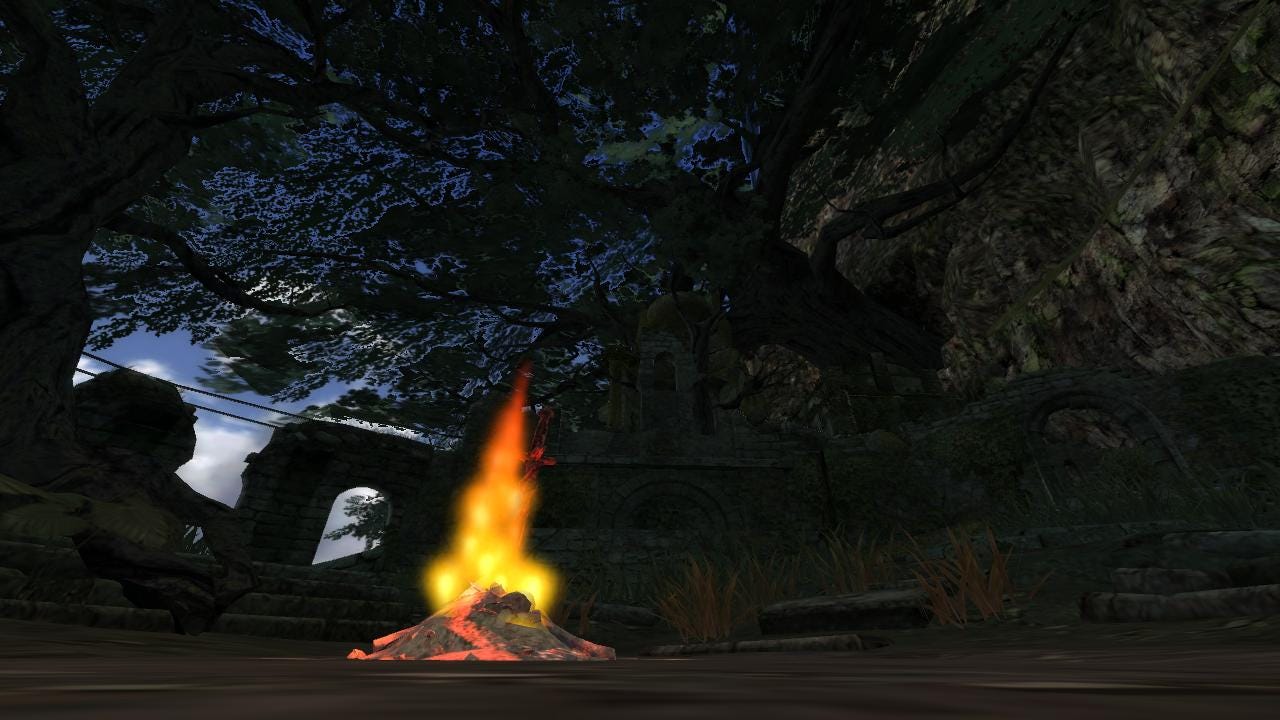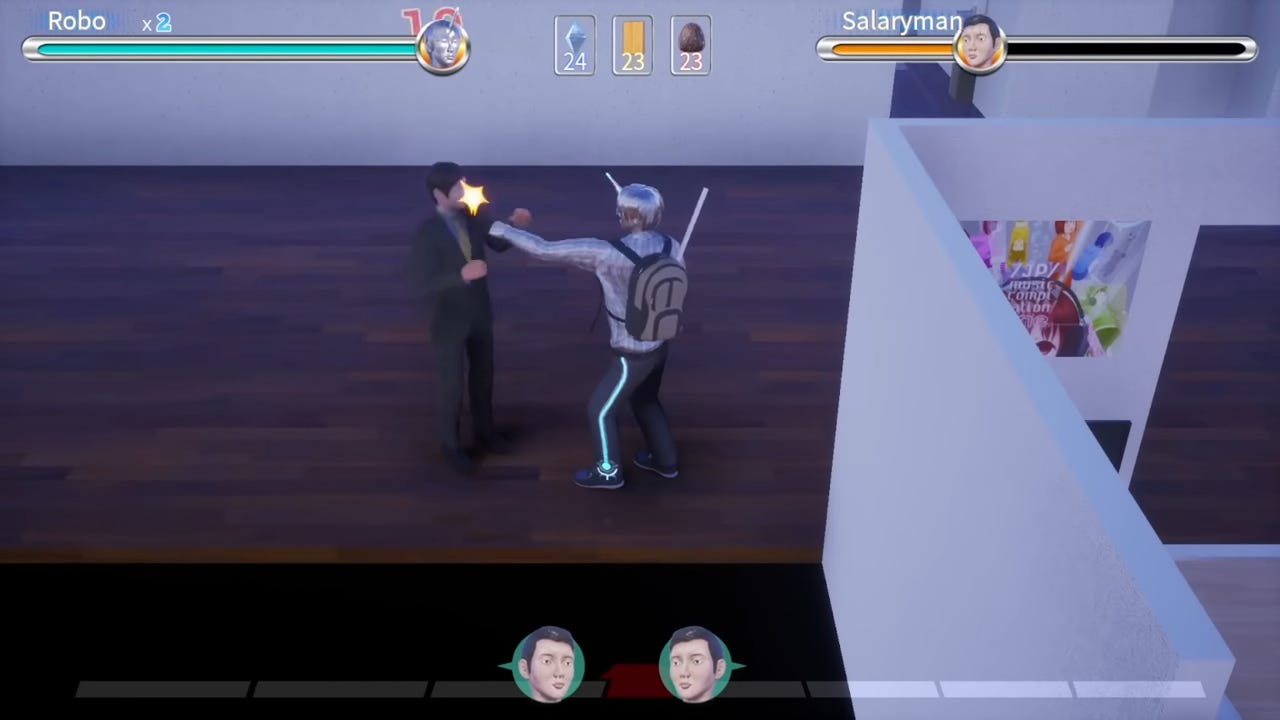EX is a research report about where culture is headed. You can learn more here. This week: Ryuichi Sakamoto’s last concert; skating games and Smosh are back, baby; and an important PSA about The Idol.
1. Whatever the machines have been learning can’t be good
The latest feel-bad AI trend to explode on Tiktok is #AIstories: supremely tasteless renditions of urban legends and “true” crime tales told in first person by slightly-animated AI faces that stare directly into the camera. Exploitation filmmaker Sam Fuller once wrote that you gotta “grab ‘em by the balls” to get an audience’s attention; the makers of these videos must be fans of his, as they always open with something like a baby saying “At only three weeks old my mother ate my brain,” a woman saying “An infested rat squeezed into my butthole,” a woman surrounded by evil-looking porpoises saying “I was r*ped by a group of dolphins,” and similar schlock. Tiktok has been banning some #AIstories, including many from the Know Your Meme roundup that spotted the trend, but it’s not clear what rule they could have broken that the others aren’t also breaking.
Swiping through these videos feels like flipping the pages of an infinite AI tabloid tailored to the basest instincts of the Tiktok audience. It’s a new low in the race to the bottom enabled by machine-learning tools, which still aren’t threatening Hollywood in any sense but are birthing original genres of content more ugly than anything previously dreamt of. One can only return to the words of Hayao Miyazaki: “I strongly feel that this is an insult to life itself.”
2. The future of skating games is Lordran
Luckier Twitter users managed to be algorithmically served this video of Dark Souls' famous Firelink Shrine transformed into an arena for sick grinds and aerials. It's actually from a mod of Tony Hawk's Underground 2, which a devoted scene has steadily modded into a neverending playground for millennial sickos and other lax gamer-types to exploit weird glitches in shared instances. Along with every Tony Hawk level ever, the ThugPRO community has designed levels around Sesame Street, Kingdom Hearts' Twilight Town, Los Santos, and every Nintendo thing ever. Still, there's something singularly appealing about watching the somber setting of Firelink Shrine transformed into a Vans Warped venue. Subversive skating games that build on the sort of cartoony energy of the later Tony Hawk games have become increasingly en vogue, from the aptly named Skatebird (you play as a skating bird) to the futuristic Rollerdrome (you skate with guns). Upcoming skating RPGs Skate Story and Thirsty Suitors will push the trend even further, but it remains to be seen whether these games can maintain the unlikely energy of this 30-second video of Solaire of Astora catching air. Will they have the courage to license Goldfinger for the soundtrack?
3. Ryuichi Sakamoto’s last concert, memorialized in AR
Whatever a viewer might think of Kagami’s execution, it's a beautiful thing that it exists at all. Kagami is a mixed reality installation that represents Ryuichi Sakamoto's final performance, captured before he passed away from cancer earlier this year. Produced as a collaboration with Tin Drum, the piece utilizes AR Magic Leap headsets that adorn Sakamoto's performance — 45 minutes of his compositions, played on a sole grand piano — with virtual set pieces and atmospheric effects. Tin Drum posthumously produced digital recreations of Sakamoto's likeness in order to complete the piece after his passing. It's on display at The Shed through the 9th.
Sakamoto originally rose to prominence as a member of the visionary electronic band Yellow Magic Orchestra, and he was no less prolific and inventive throughout his storied solo career. When it came to adopting new music-making technologies, he was relentlessly forward-thinking, helping to pioneer the use of the iconic Roland TR-808 drum machine and foreshadowing the emergence of IDM by a decade. It's apt for Sakamoto's final-ever performance to continue to push the boundaries of how music is made and how audiences receive it, though the reviewer at Wired seems to have been less than impressed by the Magic Leap 2 itself.
4. A Smosh explainer
The original kings of YouTube kids comedy returned to their classic format last week. If you’re a millennial-or-older who fell outside Generation Smosh, here’s a rundown of the channel’s 17-year history:
Anthony Padilla and Ian Hecox started the Smosh channel in 2005, doing lip syncs and music videos before developing a relatively polished early-YouTube comedy style.
They’ve been the most-subbed channel on YouTube in three different eras (most recently in 2013), once had the most-viewed video on the platform, and still have 26M subs today.
Smosh is also a big-ish media company that has employed many gaming creators and podcasters, produced sitcoms and a movie, and grew their main sketch channel to feature an “SNL-style” ensemble cast.
Anthony Padilla left in 2017, and Smosh later declined in popularity around 2019 amid corporate parent drama.
Padilla returned two weeks ago, he and Hecox re-bought Smosh, and they announced that “classic Smosh is back.”
Those who were not Smoshpilled at a young age may not find this new sketch to be “extremely their shit,” but it’s an interesting mix of 3AM YouTube weirdness, Disney Channel-ish jokes, and an adult approximation of the channel’s original hyperactive by-kids-for-kids energy. The comments are full of delighted fans, many of whom grew up to be big YouTubers, and the new stuff seems to have given the channel a shot in the arm in terms of views and subs.
5. Anime studio disgusts world with weird camerawork
Across the decaying communities of late-stage Twitter, anime fans came together to heap scorn on the off-putting style of the rom-com The Girl I Like Forgot Her Glasses, a visual experience that makes you feel like either you or the animators must have a concussion. The studio responsible, GoHands, previously made the infamous Hand Shakers, which had a distinctively mobile camera that darted around characters with little to no motivation. In the course of the minute-long Glasses clip, the camera lurches forward and behind the moving protagonist, lingers suggestively on his hand, then swoops down to an extreme low angle below his shoes while he walks “like the dame tu cosita alien,” as one commenter said. On Twitter, the CGI environments, nauseating framerate, and fisheye lens were all scrutinized, with users comparing the “gohands staircase” to Masaaki Yuasa’s Inu-Oh, Family Guy, Busta Rhymes music videos, and of course Hand Shakers.
6. The dawn of the hikikomori defense genre
A maniac-strength Japanese game about defending a hikikomori (shut-in) character from enemies trying to break into his room resurfaced with a recent Steam Next Fest demo. Pull Stay combines punch-em-while-they’re-down beat-em-up combat, tower defense elements, and a deranged sense of enthusiasm, which all played well to the streamer Jerma’s audience in late June. Though Pull Stay looks like a stiffly animated asset flip game, there’s unexpected comic zest in its codec-like dialogues, special moves, and odd minigames, including one where you beat the hikikomori with household objects until he becomes “motivated.” You get the materials needed to build defenses by destroying your neighbors’ houses. If the game comes out this year (it’s been in development for six), it could be an offbeat comedy hit in the vein of oddities like Ace of Seafood (which had an incredibly hype trailer), Shower With Your Dad Simulator, Placid Plastic Duck Simulator, etc.
The developer, Nito Souji, has an unusual story — a real-life hikikomori, he launched a Kickstarter in 2020 to fund development, which was accompanied by a massively popular “day in the life” video. He continues to maintain a YouTube channel and streams while working on the game.
7. A PSA about The Idol
Few shows in recent memory have been as thoroughly picked apart as HBO’s The Idol, a misfire so grim that even Slate struggled to find a way to call it secretly good. For many it was a show you experienced out of order through social media lowlights, like a compilation of incomplete passes: The Weeknd’s loathsome self-insert character mispronouncing “carte blanche,” the bukkake discussion, and the second episode sex scene that was called the “worst in history” and proof that “everyone involved in this shit is going to hell.”
But one correction must be made: The Idol does not actually contain a scene where The Weeknd’s character says “There’s so much cum, and it’s all coming out of my penis…I can’t believe it.” The screenshot was a joke made by Twitter comedian/pro liar @jestingtime, whose tweet went viral, then was swiped and shared and batted around the internet like some kind of Roundmeal. With more than 50M (supposed) views on Twitter, it’s possible that this fake line is the best-known bit of dialogue from the show. It’s The Idol’s legacy! But while The Weeknd says plenty of stuff like “welcome to my little shithole” in The Idol, he doesn’t actually say that one thing, so please adjust the cards in your joke file accordingly.
Chum Box
Rolling Stone's Jeff Ihaza devised a term for the phenomenon that has tightened its grip on streaming platforms and artists alike: "snippetcore," a "post-genre" consisting of algorithm-hungry chunks of music. "The snippet is not merely a hook, or a catchy verse, but a short burst of music that has become a distinct form of communication — part of the unique language of short-form video feeds," Ihaza says.
TikTok can't get enough of glass bottles shattering in stairwells, an ASMR-adjacent trend that feels like the troubled younger cousin of the hydraulic press video.
NFT apes are getting liquidated left and right due to a crypto loaning crisis. Mostly, it’s a feast of schadenfreude.
SonicFox humbled a heckler on Twitter by humiliating them during an impromptu match of Mortal Kombat 11. It's incredibly satisfying to watch SonicFox — proudly queer, proudly furry, and no stranger to silencing trolls — indulge in a mercy followed by a fatality.
The controversial streamer iShowSpeed set off a Pikachu firework for 4th of July in his room again, a throwback to last year's identical stunt.
A Hungarian company supposedly used AI to design an energy drink called "Hell Energy."
That’s it for this week. Ace of Seafood is just $2.39 on Steam right now.








